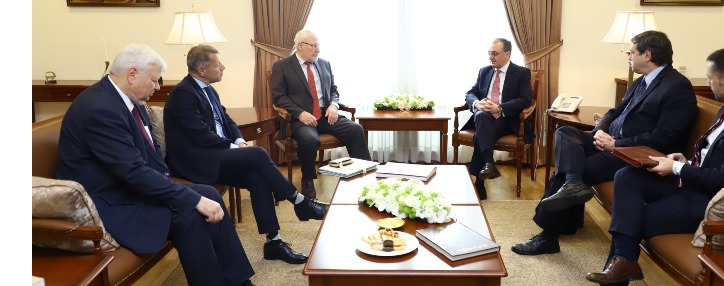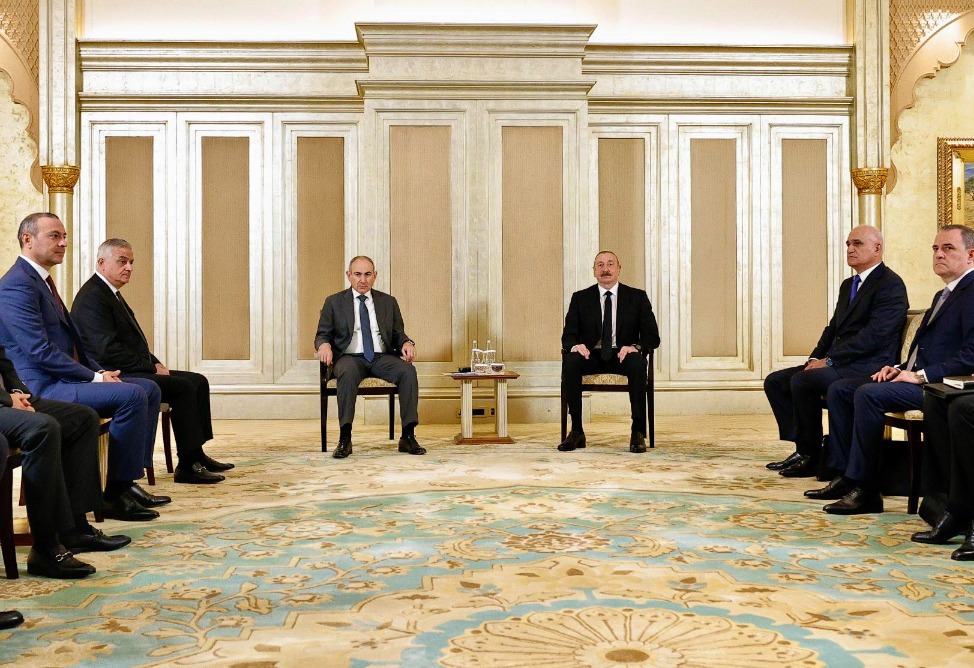Armenian FM says need to abandon bellicose rhetoric still remains on agenda
29.10.2018,
17:32
Armenia's Acting Foreign Minister Zohrab Mnatsakanyan met today with visiting Co-Chairs of the OSCE Minsk Group Igor Popov (Russia), Stefan Visconti (France) and Andrew Chauffeur (USA), as well as the Personal Representative of the OSCE Chairman-in-Office Andrzej Kasprzyk, Armenian Foreign Ministry said.

YEREVAN, October 29 /ARKA/. Armenia's Acting Foreign Minister Zohrab Mnatsakanyan met today with visiting Co-Chairs of the OSCE Minsk Group Igor Popov (Russia), Stefan Visconti (France) and Andrew Chauffeur (USA), as well as the Personal Representative of the OSCE Chairman-in-Office Andrzej Kasprzyk, Armenian Foreign Ministry said.
It said the men exchanged views on the latest meetings on the Karabakh settlement, which took place after the formation of the new Armenian government, as well as on the regional visits of the international peace brokers. Mnatsakanyan expressed satisfaction with the positive dynamics regarding the issue.
Mnatsakanyan and the co-chairs spoke also about the meeting between Armenian Prime Minister Nikol Pashinyan and Azerbaijani President Ilham Aliyev, held at the end of September in Dushanbe, and the agreements they reached. Mnatsakanyan stressed that their implementation will help shape and stimulate the atmosphere of peace.
Mnatsakanyan also singled out the need to abandon bellicose and destructive rhetoric, saying it still remains on the agenda.
The Minsk Group Co-Chairs are scheduled to visit also Nagorno-Karabakh capital Stepanakert, and then Azerbaijan.
The Nagorno-Karabakh conflict erupted into armed clashes after the collapse of the Soviet Union in the early 1990s as the predominantly Armenian-populated enclave of Azerbaijan sought to secede from Azerbaijan and declared its independence backed by a successful referendum.
On May 12, 1994, the Bishkek cease-fire agreement put an end to the military operations. A truce was brokered by Russia in 1994, although no permanent peace agreement has been signed. Since then, Nagorno-Karabakh and several adjacent regions have been under the control of Armenian forces of Karabakh.
Nagorno-Karabakh is the longest-running post-Soviet era conflict and has continued to simmer despite the relative peace of the past two decades, with snipers causing tens of deaths a year. On April 2, 2016, Azerbaijan launched military assaults along the entire perimeter of its contact line with Nagorno-Karabakh. Four days later a cease-fire was reached. -0-
It said the men exchanged views on the latest meetings on the Karabakh settlement, which took place after the formation of the new Armenian government, as well as on the regional visits of the international peace brokers. Mnatsakanyan expressed satisfaction with the positive dynamics regarding the issue.
Mnatsakanyan and the co-chairs spoke also about the meeting between Armenian Prime Minister Nikol Pashinyan and Azerbaijani President Ilham Aliyev, held at the end of September in Dushanbe, and the agreements they reached. Mnatsakanyan stressed that their implementation will help shape and stimulate the atmosphere of peace.
Mnatsakanyan also singled out the need to abandon bellicose and destructive rhetoric, saying it still remains on the agenda.
The Minsk Group Co-Chairs are scheduled to visit also Nagorno-Karabakh capital Stepanakert, and then Azerbaijan.
The Nagorno-Karabakh conflict erupted into armed clashes after the collapse of the Soviet Union in the early 1990s as the predominantly Armenian-populated enclave of Azerbaijan sought to secede from Azerbaijan and declared its independence backed by a successful referendum.
On May 12, 1994, the Bishkek cease-fire agreement put an end to the military operations. A truce was brokered by Russia in 1994, although no permanent peace agreement has been signed. Since then, Nagorno-Karabakh and several adjacent regions have been under the control of Armenian forces of Karabakh.
Nagorno-Karabakh is the longest-running post-Soviet era conflict and has continued to simmer despite the relative peace of the past two decades, with snipers causing tens of deaths a year. On April 2, 2016, Azerbaijan launched military assaults along the entire perimeter of its contact line with Nagorno-Karabakh. Four days later a cease-fire was reached. -0-



